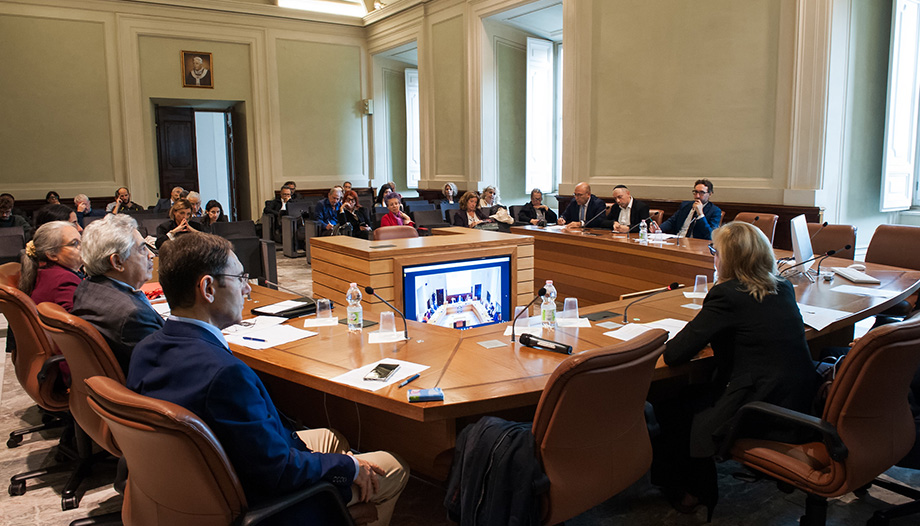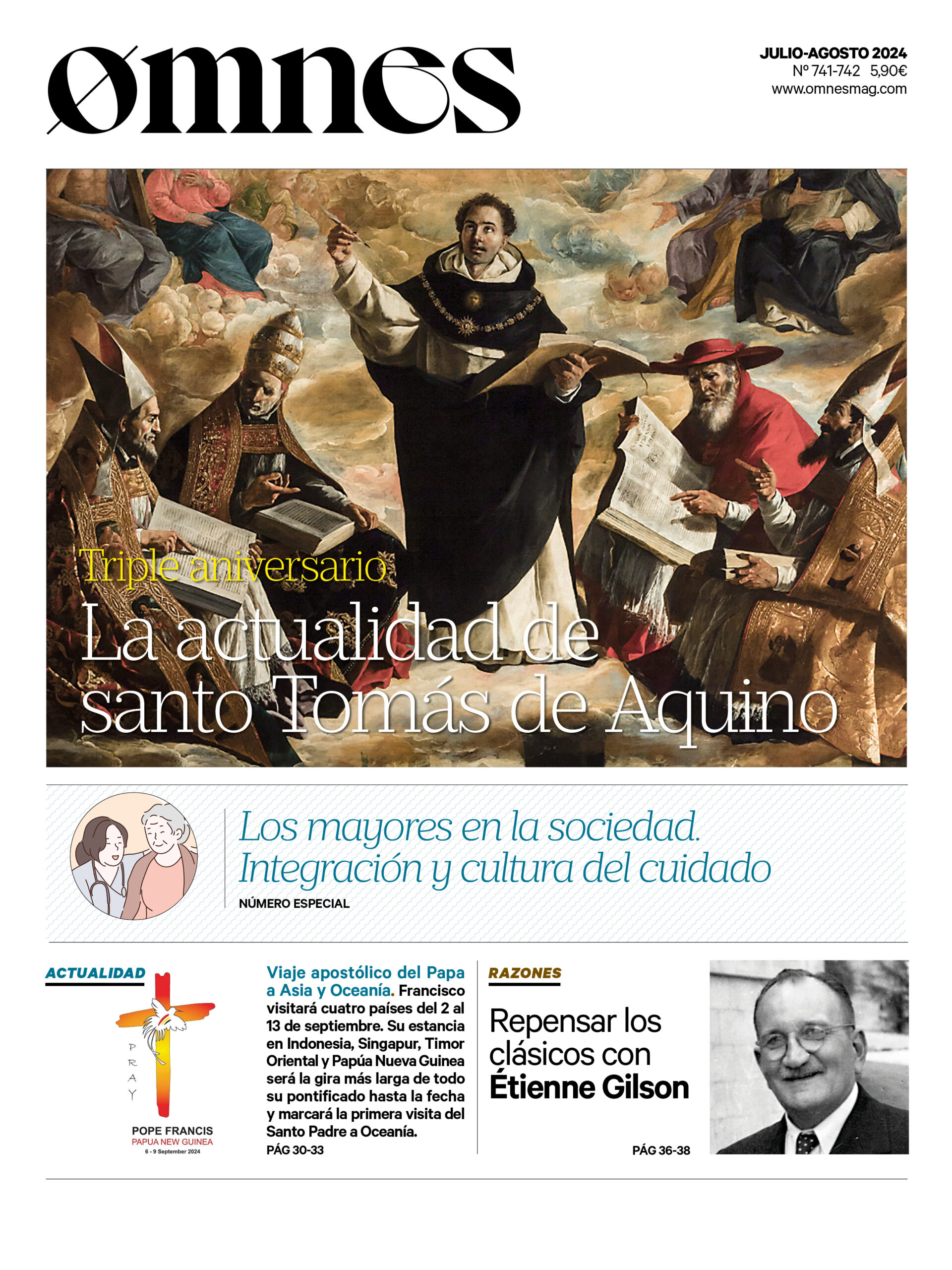"Religions and Media. Between secularization and the digital revolution" was the theme and title of the study day promoted by the ISCOM Association and the "Journalism and Religious Traditions" Committee of the Pontifical University of Santa Croce. On October 25, representatives of various religious traditions and professionals in the field reflected on the presence of Judaism, Islam, Christianity and Hinduism in the media landscape, which is increasingly situated in a very dynamic cultural and political context.
After the massacre of October 7, 2023 in Israel, one cannot help but reflect on the media repercussions of the war in the Middle East (and in other current and potential armed conflicts affecting the various regions of the world), raising the question of what is the role and function of religions in these new and old scenarios, and how this role is represented in the media and social networks. And all this, beyond censorship, disinformation and manipulation, so frequent in times of peace, and even more so in times of war.
The role of religion and communication
Is religion part of the problem or part of the solution? In his keynote address, Marta BrancatisanoProfessor Emeritus of Dual Anthropology at the Pontifical University of Santa Croce, said that "it is neither logical nor licit to attribute to faith a meaning and a result that is not in favor of life. Because "one cannot associate truth with violence". "It is necessary to attain," Brancatisano emphasizes, "a knowledge of religious traditions that today, as always, constitute the cultural basis on which societies rely in all their aspects."
Alessandra CostanteSecretary General of the National Federation of the Italian Press, stressed the importance of responsible reporting: "Respecting the different cultures and religious traditions, as journalists we are called to play our role and function with rigor, in the name of the substantive truth of the facts, which we cannot do without. Especially at a time like the one we are living in, with the risks of radicalization." "Religions in the 21st century - he continued - have unexpectedly returned to the spotlight".
This was an opinion shared by Ariel Di PortoThe media should contribute to the knowledge of the various religious phenomena in an increasingly multicultural and multi-religious society," said the former chief rabbi of Turin, who is a member of the Jewish Community of Rome.
Along the same lines, Abdellah RedouaneSecretary General of the Islamic Cultural Center of Italy, indicated that "the media constitute an opportunity and at the same time a threat for the different faiths. Opportunity because the religious authorities have been able to spread their word in the public space. Threats - concluded Redouane - because there is concern that some media can adulterate religious sensibility, with an unquestionable diffusion of secularism and rejection of the religious phenomenon, whatever it may be".
Freedom of religion and freedom of information
One of the round tables of the Conference focused on analyzing to what extent it is possible to harmonize the principles of religious freedom and freedom of information. Apparently they would seem to be in conflict or incompatible with each other. However, "one is not completely free", in the opinion of Davide Jona FalcoThe Communication Advisor of the Union of Italian Jewish Communities (U.C.E.I.), "if one cannot express and live one's religion, if one does not have the right to express one's opinion and receive accurate information or communicate information or ideas without outside interference".
The balance between freedom of expression and religious freedom is particularly sensitive when it comes to religious satire or theological criticism. Zouhir Louassinia journalist and writer for Rai News since 2001, has proposed "finding a compromise that respects both freedoms. That requires constant dialogue and a deep understanding of diverse cultural and religious sensitivities. The key could lie in promoting education and mutual empathy, recognizing the importance of both freedoms in building a democratic and inclusive society."
Muslims, too, therefore, enter (and are called to enter) into dialogue with the world. "However," he clarified Mustafa Cenap Aydinsociologist of religions and director of the Tevere Institute Center for Dialogue, "when speaking of Islam, it is necessary to clarify which Islam is being referred to, given the plural and complex reality of Islam in dialogue with the world, paying particular attention to the theological foundations of interreligious dialogue in the Muslim holy book, the Koran.
On religious freedom, peaceful coexistence and the process of secularization, he has reflected on Paolo CavanaProfessor of Canon Law and Ecclesiastical Law at LUMSA University in Rome. According to him, "globalization has made religious communities necessary actors in the construction of multi-ethnic and multi-religious societies". However, in his opinion, only freedom of information is capable of guaranteeing "the mutual knowledge that constitutes the fundamental presupposition of all interreligious dialogue, based on respect for the human person".
How can the culture of different religious traditions be told on television? Marco Di Portojournalist, writer and author of "Sorgente di vita", a program on Jewish culture broadcast on RAI, has drawn attention to "the importance of narrating the history and traditions of the 'Jewish world' to a general audience. And the challenge of delving into complex issues in a direct and understandable way, appropriate to the speed and immediacy of the media. Jewish culture -adds Roberto Della RoccaDirector of the Department of Education and Culture of the Union of Italian Jewish Communities - can become a meeting place for different traditions. Jewish culture is characterized by multi-territorialism and multilingualism, a consequence of a Diaspora that has allowed Jews to sow and harvest fertile fruits, within the Hellenistic, Arab-Islamic and finally European culture".
Telling stories with religious content
Is there a religious way to tell a story with religious content? According to Luca Manzi, writer and screenwriter, co-author of series such as "Don Matteo", "Boris", "Ombrelloni" and "The net", "analyzing international seriality, the structure of the story has experienced in the last two decades an unprecedented change, establishing for the first time a difference between a structural and intrinsically religious story, the classic one, and one that dispenses with God".
An example of this is "The Chosen" (2017), the American series that is inserted in a rich tradition, to which the Italian cultural industry has contributed significantly: from the historical-cultural proposals of the 60s-70s to the Golden Age of religious seriality in the 90s-00s.
"But alongside this narrative," notes Sergio Perugini, journalist and secretary of the CIS National Film Evaluation Commission, "it is important to highlight how religion often returns in contemporary seriality (as in cinema) stripped of its complexity, used only for its symbolic codes or reduced to flat and problematic stereotypes."
October 7 has been mentioned, a date tragically destined to mark the history of mankind. But even after September 11, nothing is the same as before. Ahmad EjazThe West is discovering Islam as an entity and an enemy at the same time," he says. Suddenly, opinions emerge and concepts and identities are mixed. "The result," he adds, "is a new ignorance that leads to a national-popular prejudice structured in condemnations, judgments and labels unfortunately on both sides." "Everyone feels simultaneously accused and under attack," Ejaz concludes.
Is it possible to identify a style of presence (even of Christians) on social networks? Fabio Bolzettajournalist and president of the Association of Italian WebCatholics (WECA), observes that "in order to inhabit the digital continent in a synodal time, the guidelines are encounter and listening. While on the Net the opportunities of encounter are growing for those who are engaged, as Christians, in digital communication: witnesses, digital missionaries or influencers? Because the vocation and commitment to proclamation must be recognized first and foremost".
Hindu culture was also present at the event, with the vice-president of the Italian Hindu Union (UII), Svamini Hamsananda Ghiri, who drew attention to the impact of secularization and technological progress, inviting "to reflect on the value of the sacred on a personal, social and religious level, and on the importance of keeping this value alive in a society that tends more and more towards materiality, through a productive encounter between religions and information, making the most of the digital tools available.
Finally, Swamini Shuddhananda Ghiri observes how "Western culture, which defends the right to freedom, should also support the right of religions to make their own identity known in a correct way and, at the same time, to know the other beliefs through the idea of the sacred as a common denominator.












